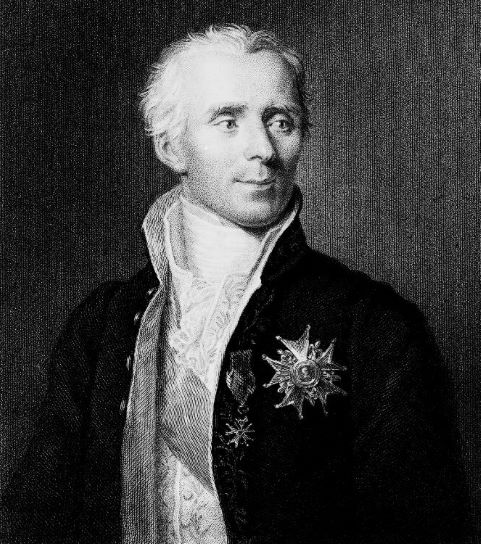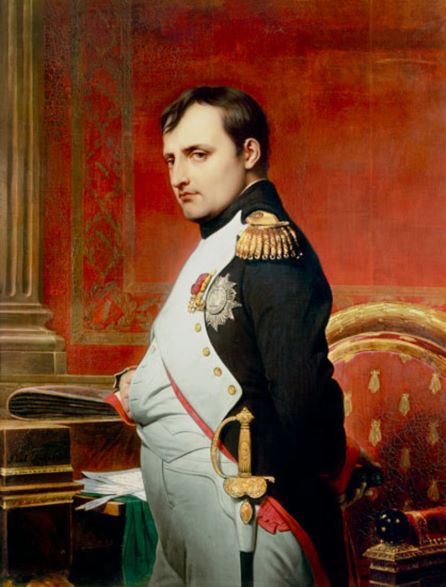- About MAA
- Membership
- MAA Publications
- Periodicals
- Blogs
- MAA Book Series
- MAA Press (an imprint of the AMS)
- MAA Notes
- MAA Reviews
- Mathematical Communication
- Information for Libraries
- Author Resources
- Advertise with MAA
- Meetings
- Competitions
- Programs
- Communities
- MAA Sections
- SIGMAA
- MAA Connect
- Students
- MAA Awards
- Awards Booklets
- Writing Awards
- Teaching Awards
- Service Awards
- Research Awards
- Lecture Awards
- Putnam Competition Individual and Team Winners
- D. E. Shaw Group AMC 8 Awards & Certificates
- Maryam Mirzakhani AMC 10 A Awards & Certificates
- Two Sigma AMC 10 B Awards & Certificates
- Jane Street AMC 12 A Awards & Certificates
- Akamai AMC 12 B Awards & Certificates
- High School Teachers
- News
You are here
Quotations in Context: Napoleon
The advancement and perfection of mathematics
are intimately connected with the prosperity of the State.
The story of Pierre-Simon Laplace’s presentation of his work Mécanique céleste to Napoleon is well known. According to Augustus De Morgan in A Budget of Paradoxes (first published in London in 1872):
Napoleon, whom some wags had told that this book contained no mention of the name of God, and who was fond of putting embarrassing questions, received it with—‘M. Laplace, they tell me you have written this large book on the system of the universe, and have never even mentioned its Creator.’ Laplace, who, though the most supple of politicians, was as stiff as a martyr on every point of his philosophy or religion (ex. gr. even under Charles X. he never concealed his dislike of the priests), drew himself up, and answered bluntly, `Je n’avais pas besoin de cette hypothèse-là’ [I did not need that hypothesis]. Napoleon, greatly amused, told this reply to Lagrange, who exclaimed, ‘Ah! c’est une belle hypothèse; ça explique beaucoup de choses’ [Ah! It is a beautiful hypothesis; that explains a lot; De Morgan 1872, pp. 249–250].

Stipple engraving of Laplace by James Posselwhite after Jacques-André Naigeon.
Public domain, Wellcome Collection.
Several years later, in 1812, Laplace also presented Napoleon with a copy of his work Théorie analytique des probabilitiés, although this time he did not do so in person. In the summer of 1812, Napoleon had begun his ill-fated invasion of Russia, and by the end of July he had captured the city of Vitebsk (which is located today in the northeastern corner of Belarus, near the Russian border). It was from this city on August 1 that Napoleon sent a brief letter to Laplace acknowledging the receipt of his work.

Painting of Napoleon by artist Paul Delaroche, 1838.
Public domain, Wikimedia Commons.
Napoleon began the letter by admitting that (not surprisingly under the circumstances) he didn’t have the time to read the work at present; however, he praised Laplace for both this and his other works that had helped to develop and extend knowledge of mathematics, the “first of sciences.” The letter concluded with the subject quotation of this column.
The full text of the letter, which is shown below, appears in volume 24 of Correspondance de Napoléon [Napoleon 1868, p. 131]:
AU COMTE LAPLACE
CHANCELIER DU SÉNAT ET MEMBRE DE L’INSTITUT, A PARIS
Vitebsk, 1er août 1812
Monsieur le Compte Laplace, je reçois avec plaisir votre traité du calcul des probabilities. Il est un temps où je l’aurais lu avec intérêt; aujourd’hui je dois me borner à vous témoigner la satisfaction que j’éprouve toutes les fois que je vous vois donner de nouveaux ouvrages qui perfectionnent et étendent cette première des sciences. Ils contribuent à l’illustration de la nation. L’avancement et la perfection des mathématiques sont intimement lies à la prospérité de l’État.
Napoléon
References
De Morgan, Augustus. 1872. A Budget of Paradoxes. London: Longmans, Green and Co.
Napoleon. 1868. Correspondance de Napoléon Ier. Vol. 24. Paris: Imprimerie Impériale.
“Quotations in Context” is a regular column written by Michael Molinsky that has appeared in the CSHPM/SCHPM Bulletin of the Canadian Society for History and Philosophy of Mathematics since 2006 (this installment was first published in November 2011). In the modern world, quotations by mathematicians or about mathematics frequently appear in works written for a general audience, but often these quotations are provided without listing a primary source or providing any information about the surrounding context in which the quotation appeared. These columns provide interesting information on selected statements related to mathematics, but more importantly, the columns highlight the fact that students today can do the same legwork, using online databases of original sources to track down and examine quotations in their original context.
Michael Molinsky (University of Maine at Farmington), "Quotations in Context: Napoleon," Convergence (July 2023)




